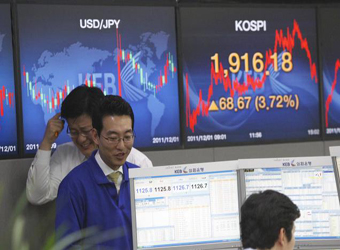Japanese shares were under pressure on Thursday after jumping more than 2 percent in its previous session with a weaker dollar weighing on exporters.
Japan’s Nikkei 225 traded down 0.33 percent as the dollar’s momentum waned overnight.
Electronics conglomerate Sharp however bucked the trend, up 8.87 percent to 319 yen a share, extending yesterday’s gains of more than 8 percent, on news that it was considering an initial public offering for Sakai Display Products, its LCD joint venture with Hon Hai Precision Industry, Nikkei business daily reported.
Toshiba was up 4.11 percent to 288.8 yen per share after Chairman Shigenori Shiga said that he heard the Japanese banks were ready to provide financial support after it was hit earlier in the week by fresh reports of profit padding, Reuters reported.
Last week, Toshiba said it may have to book several billion dollars in writedowns related to a U.S .nuclear power plant construction company acquisition and the stock has fallen 34.8 percent since then.
Australia’s ASX 200 rose 0.3 percent, led by energy and material plays. The gold sub-index bounded up 2.47 percent as the yellow metal hit a four-week high.
Gold miner Newcrest Mining was up 1.97 percent to A$20.75 per share, while Evolution Mining jumped 1.9 percent to A$2.15.
In South Korea, the Kospi was down 0.06 percent.
LG Display slipped 0.16 percent at 31,400 won per share, while the heavily-weighted Samsung Electronics was down 0.88 percent at 1,791,000 won, after LG Display chief executive said the company was in talks with Samsung Electronics about supplying TV panels, although more concrete details have yet to be released.
Over in Hong Kong, the Hang Seng gained 1.3 percent, after the Nikkei Purchasing Managers’ Index (PMI) for December showed that the private sector economy might be on the cusp of a recovery, with a reading of 50.3, compared to November’s PMI at 49.5.
A survey reading above 50 indicates expansion, while a figure below 50 represents contraction. The Hong Kong dollar, which is pegged to the greenback, moved weaker within its trading band after the data.
Energy companies led the Hang Seng’s gains, with China National Offshore Oil up 2.65 percent to 10.06 Hong Kong dollars per share, PetroChina up 4.19 percent at HK$5.97, and Sinopec up 2.9 percent to HK$5.68.
Mainland Chinese shares were mixed, with the Shanghai composite up 0.11 percent and the Shenzhen composite effectively unchanged.
China’s Caixin services purchasing managers’ index (PMI) for December rose to its highest reading since July 2015 at 53.4 compared to 53.1 in November. This further boosts the view that China’s economy is gaining ground, after manufacturing PMI readings earlier this week also came in stronger than expected.
The dollar fell against a basket of currencies from its highest levels in 14 years this week. The greenback traded at 102.22 on Thursday during Asian hours, slipping from Wednesday’s high at 103.44.
Among other currency majors, the euro traded at $1.0523, while the yen fetched 116.41, compared to levels above 118 yesterday and the Australian dollar was at $0.7297.
The U.S. Federal Reserve’s December meeting minutes were released on Wednesday, showing officials voted for the first interest rate hike in the year based on market reactions to Donald Trump’s surprise win and in anticipation of aggressive fiscal policy ahead.
Kathy Lien, managing director of foreign exchange strategy at BK Asset Management, said the minutes suggested the Fed’s optimism was based solely on Trump’s ability to follow through on his campaign promises for major tax cuts and big spending.
“In other words, the Fed is betting on Donald Trump delivering, which is a risky gamble,” said Lien.
The Fed raised interest rates in December for just the second time in a decade and forecast three rate hikes for 2017.
But the minutes also revealed that the Fed was concerned about a stronger dollar, and that more fiscal stimulus could raise demand above sustainable levels.
During Asian trade, the West Texas Intermediate futures slipped 0.19 percent at $53.16 per barrel, while global benchmark Brent dipped 0.28 percent to $56.30.
Oil prices had added more than 2 percent overnight, with “a weaker dollar helping crude’s cause, as did the American Petroleum Institute’s (API) surprising 7.4 million barrel drawdown in inventory late in the session,” said Jeffrey Halley, senior market analyst at OANDA, in a note on Thursday.
Spot gold was up 0.86 percent at $1,173.60 per ounce, at a four-week high.
Meanwhile, the Dow Jones industrial average rose 60.4 points, or 0.3 percent, to 19,942.16. The S&P 500 gained 12.92 points, or 0.57 percent, to end at 2,270.75, while the Nasdaq composite advanced 47.92 points, or 0.88 percent, to close at 5,477.
Source: CNBC


